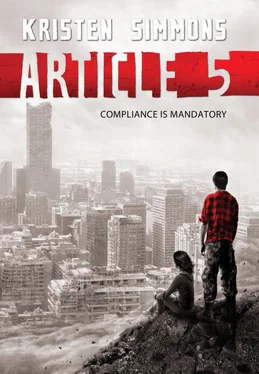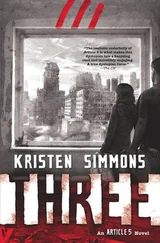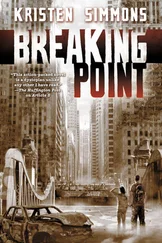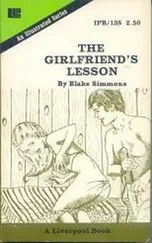The déjà vu receded, but the feelings echoed through the space between us. Fear, embarrassment, intimidation. Security.
“I never asked you to protect me,” I said quietly. Not then, not now.
I could see from the look on his face that it would be no use arguing with him. Even if he acknowledged that I was completely capable of taking care of myself, on some level he would still be hardwired to look after me. A pressure grew in my chest the longer I watched him. I turned away.
“Anything else you want to tell me?” I asked.
“What?” He sounded startled.
“Rules,” I said, scowling. “Any other rules?”
“Oh.” He shook his head. “For God’s sake, don’t trust anyone.”
I agreed, but only halfheartedly. Because despite everything, I had gotten back in the truck with him. And since I’d made that choice, I hadn’t been afraid.
* * *
ATeleven thirty, we arrived in Harrisonburg, Virginia.
My eyes were seeing double from staring vigilantly out the windows for the MM. Every few moments I would glance down at the tiny print on the road map to help Chase navigate, but the moment I assured we were on track, I was scanning for soldiers again.
The rain had stopped, and this road was clearer, although we had to swerve around the occasional fallen tree. A few cars had passed, but none for a while.
The outskirts of town were mostly rural. High wooded mountains climbed in the distance to our right. The atmosphere cast a purple hue over the layers until, far against the horizon, the soaring peaks blended completely with the sky.
Most of the homes were deeply set on acres of land, boarded up and tagged with spray paint, like the abandoned buildings in Hagerstown. From the highway I couldn’t discern the details, but I had a feeling it was the same symbol: an X over the MM insignia. I began to feel a slight swell of pride wherever I saw it; it was proof there were some people out there that hated the MM as much as I did.
Chase exited onto a street cratered with mud-filled potholes. The truck jostled from right to left like a theme-park ride, until finally the asphalt gave way to gravel, and the grassy hills beside us rolled like waves.
Rudy Lane was nearby, but Chase didn’t want to park in front of the checkpoint. We were leaving the truck, and whatever extraneous supplies we couldn’t carry—Rick and Stan’s shotgun included—behind.
If Chase hadn’t insisted we hike off road in the high overgrown tangles, I would have run the whole way there. Even though I knew the chances were slim, I couldn’t help but hope that maybe my mother was still at the checkpoint. I might see her in just a few minutes! After everything we’d been through, we were finally close.
The time passed, indifferent to my impatience, and soon we entered a small rural neighborhood. As we edged around a central clump of trees, a narrow, two-story Victorian house appeared. It struck me as a pleasant place: sunshine yellow, with white decorative trim, wooden steps, and a quaint little porch. It might have been welcoming had the two rocking chairs not been chained to the railing, and had the thick boards not been nailed across the front door.
190 Rudy Lane.
“This is it?” I asked, feeling a growing sense of unease. It did not look inhabited, but maybe that was for security.
“I think so.” He removed the gun from his belt. It wouldn’t be left in the bag after what had happened at the sporting goods store. The precaution sent a quiver of anxiety through my chest.
We followed the circular step-stones around the yellow siding to where the back door gave way to an open brick patio. The edge of the yard was bordered by a broken-down laundry line, and beyond it lurked a dark, dense forest. Chase continued around the perimeter before returning to the entrance.
“Come here,” he called after a moment. I followed.
There, posted on the side paneling of the house, was a dented tin sign, marked by black, spray-painted letters. It wasn’t crossed out like the MM insignia we’d seen around, but it was clearly FBR propaganda.
One Whole Country, One Whole Family.
Chase had a perplexed look on his face.
“You don’t think it’s a trap, do you?” An image filled my mind of soldiers meeting here, but then I realized how ridiculous that was. The MM paid for buildings and signs, not abandoned houses tagged with graffiti.
“No,” he answered, but could not provide a better answer. He turned back toward the rear of the house.
We knocked on the back door. Nothing.
The concern that had been brewing within me finally boiled to the surface.
“Are you sure it was Thursday?”
Chase’s temper flashed. “That’s what my uncle said.”
Your uncle also abandoned you at the age of sixteen, I wanted to say. I’d foolishly trusted him because Chase trusted him, but I’d forgotten that I barely trusted Chase.
“Do you think we’re too late?” It wasn’t yet noon, but we didn’t know when the carrier left. My mistake was looming just over my head, ready to rain down its punishment.
One shoulder shrugged. I jiggled the doorknob hard, but it was locked.
No answer.
This had to be it. We weren’t wrong. We couldn’t be wrong. Not after everything we’d been through.
I hadn’t realized how fragile I was until that moment, when all the fear and anxiety slammed into me with the force of a sledgehammer and I cracked. I beat my hands against the wood. I kicked the door, bruising my feet. I screamed for them to let me in. I barely registered Chase’s arm around my waist, yanking me back.
He set me aside with one stern look. Then he backed up slightly and, with a heave, kicked the door, just above the handle. A loud crack split the air. He kicked again, and the wood bowed, dislodging the lock.
“Stay here,” he told me as he pushed through into the dark room and disappeared. I was still breathing hard and shaking. A few moments later he returned, beckoning me forward into the glow of his flashlight. Without a thought, I reached for the switch, and to both of our surprise, an overhead light poured brightness into a quaint, rectangular kitchen.
“Huh,” said Chase. “We must be close enough to a city to get standardized power.”
The space smelled heavily of mildew, but after a short while I no longer noticed. Atop the counter were blankets, a cardboard box of secondhand clothes, and empty cans of nonperishable foods. Canned vegetables. Tuna fish. There was a paper shredder plugged into the wall and a stack of blue forms about the size and shape of index cards.
U-14 forms.
Chase had referenced this when we’d been pulled over. This was what you had to have to cross into a Red Zone.
This certainly seemed like the right place. So where was the carrier?
Down the hallway was a bedroom with not much more space than a double bed and dresser required. A dining room followed. The overhead chandelier blanketed the room with a nostalgic kind of elegance, despite the cobwebs that connected each light. There were fresh footprints in the dust on the floor.
I wandered to the bathroom and found the glass-box shower, immediately remembering how dirty I was from the mud and the ash and the vomit. Linens were stacked in the narrow closet behind it. For some reason the sight of clean towels made me miss home terribly.
Chase searched upstairs, but there was no one home.
“Do you think we missed him?” I asked urgently.
“I doubt it. I think he might just be out for a while. No one would be stupid enough to leave those forms on the counter for a full week.”
Unless he didn’t have the time to clean up. Neither of us voiced what we both thought.
Читать дальше










